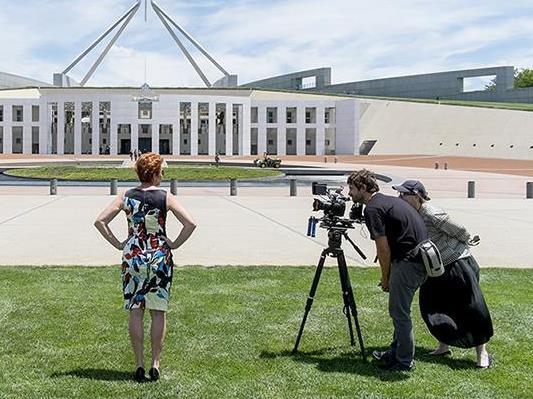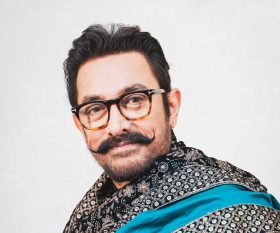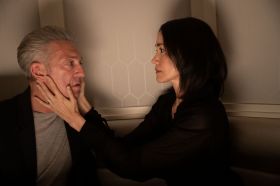Image: Hanson in front of parliament in the shoot for Anna Broinowski’s Pauline Hanson: Please Explain!
Just when the truth no longer matters in politics, leaders can lie with impunity and the suffering of millions can be erased with a sneer and a snarl on Twitter, the Australian International Documentary Conference released its full program, covering 5-8 March 2017 at Melbourne’s ACMI.
As conference director Andrew Wiseman said, ‘I think we live in interesting times and these times demand great stories. Factual has always risen to investigate and explore and illuminate current events and that has never been more important than now.’
It will be the most electric atmosphere for a decade. It will be truly international. ‘We have over 45 international buyers coming out,’ said Wiseman, ‘and 46 sessions and masterclasses and networking events which provide a really fabulous opportunity for people to explore and present ideas. The conference needs to provide great sessions, and a space where you are surprised by the people you bump into and the stimulating ideas that come your way.’
From the first moments the conference focuses on American media, with a screening of the full 467 minutes of OJ: Made in America, introduced by its director, Era Edelman.
Tuesday’s opening plenary, More than a Game – sport, race and power, puts Edelman on stage with John Battsek, the prolific and extraordinary UK executive producer. This will be a classic conversation which explores the way a surface narrative reveals deep cultural processes and social conflict.
The annual Stanley Hawes speech, now grown into the Robin Anderson State of the Art address, will be delivered by Mariam Veiszadeh:
Self-proclaimed “reformed lawyer” turned social justice activist Mariam Veiszadeh will provide this year’s address, tackling the AIDC 2017 theme, Three Sides to Every Story. The winner of the 2016 Daily Life Woman of the Year Award, and most recognised for her tireless work promoting tolerance and diversity in Australia, Mariam will share her views on truth, courage and the state of our art, and the world, moving into 2017.
To Wiseman, that theme is central to the thinking behind AIDC 2017. ‘It can be explored by everyone through the prism of their work, and I think its important that people run with a theme, and invest in it in ways that work for them’.
Ironically, the political events since the US presidential election are a challenge to that very notion. How can we deal in subtlety when we are pounded with the crude binaries of ‘alternative facts’ and truth v lies?
Political Documentary in a Post-Truth World, about the relationship between social media and the political documentary, allows Anna Broinowski to discuss storytelling and the post truth world with Nicola Harvey, the managing editor for Buzzfeed Australia. One issue will be the role of viral video to both short and long form video journalism. Broinowski made Pauline Hanson: Please Explain! about the monster in our midst, but she is also a deep student of propaganda, after making Aim High in Creation with North Korean filmmakers.
Gender, Tech & Resistance features US filmmaker and Obama guest at the White House Nancy Schwartzmann who challenges notions of neutrality in technology, as sexist and racist ideas step into the open.
The world is entering a new era with hacking, targeted use of social media and ‘fake news’ challenging our ideas of the role of media in a democracy, and many hard fought social justice gains coming under attack. Not to mention the outright and shameless misogyny demonstrated by the USA’s new President.
She is a key part of the 2017 Impact strand, which the AIDC is now running each year to track and enable the dawning power of audience engagement in socially responsible filmmaking. She is a filmmaker, an impact producer, an app creator, a social activist and public intellectual.
The Impact Strategy hack is back to cross-examine specific projects, while the One Film To Save The World?: Exploring the Ecology of Impact session looks at the of the impact producer in detail. Along with Australian producer Rebecca Barry from Media Stockade, it features Patricia Aufderheide, the distinguished American IP expert, whop will be present to stir the pot about ownership and fair use.
There are some lovely sidebar(ish) events. James Hewison will convene a chewy session on the hybrid film –
These films that grow between the cracks of narrative and documentary are not without their detractors. But increasingly hybrid films are opening up new platforms for filmmakers to exhibit their work, and entice new audiences.
John Battsek, Melbourne filmmaker Richard Lowenstein and Mandy Chang, head of ABC TV Arts will talk Archival Revival. The various programmers will discuss True Crime, formats and the nuances of specialist factual. In Trailer Surgery, Sydney’s own trailer guru Danny Lachevre of Solid Statel reveal some secrets.
Through an examination of story structure, key concepts, emotional appeal, positioning and target audience across a range of trailers this class will reveal exactly what goes into this important marketing tool to drive engagement.
The Cane Toad Cup, AIDC’s own debating snarkfest, crashes deep into the domestic issues which have been riling the sector.
You can’t take MEN out of Documentary will be a light-hearted (but still incisive) look at a topic that in recent years has seen sausages roll down the AACTA red carpet, Meryl Streep throw tomatoes at RottenTomatoes.com, and fake beards scratch the cheeks of the establishment at Cannes.
As always, the AIDC is accountable to two hard core communities who need to be engaged in the nuts and bolts. The producers need to know they have some opportunities for deals, and will look to people like Annie Murray, senior commissioner from Sky Television NZ, Anthony Kimble from Cineflex Rights, Jules Olroyd from National Geographic, Laura Fleury from A+E Networks along with people from CANAL+, Discovery Communications, NHK and BBC Storyville in the person of Editor Kate Townsend.
For younger filmmakers, there need to be even clearer reasons to justify the $660+ cost. There is a pre-plenary workshop, Shake It Up!
Shake It Up! is a workshop open to screen practitioners keen to add their voice to a discussion around new opportunities and strategies for our industry. Participants will work collectively to discuss barriers to success for emerging practitioners and come up with a selection of new ideas and initiatives.
Times They are A-Changin’ (kind of an old person’s joke)
In this unique plenary, three young game changers will come face-to-face with three established policymakers to put forth changes that could benefit early to mid-career practitioners – and encourage growth in our sector.
Desperately Seeking Distribution
Crowdsourcing, “event” screenings, on-demand and multi-platform releases, as well as a host of clever campaign and social media strategies are just some of the ways filmmakers are shining a light on their work and breaking new ground.
Emerging screenmakers will find the sessions on virtual reality pretty interesting, and the atmosphere will be unique. While the experts like Katy Morrison from VRTOV and Lynette Walworth are gracious and accessible, older filmmakers still lie on the floor whimpering. The form, pushed along here by Film Victoria is both the most isolating medium and also the most saturated with physical reality, so visceral that the very notion of story is under threat.
One key session here is Revolution or Evolution, run by Iranian-Canadian Navid Khonsari, who made a documentary game, 1979 Revolution about the transformation of Iran.
How can documentary co-exist and collaborate with alternative platforms? Can VR break into the mainstream? And who will really be in control? In this special keynote address, Navid considers some of the questions on the horizon, to get us thinking about which revolution we want to see and how we can make it happen.
All the who we are/what’s the buzz sessions are very relevant. The experienced producers will trundle along because they want to see how the nuances change. For comparative outsiders they are a great way to establish a national and international map of opportunities and finance mechanisms.
As Wiseman said, the business side is pretty central. ‘The marketplace which is enormously important and a core element is there in spades, with the round tables, the FACTory pitching room and the speed pitching. They were extremely strong elements last year, and they are central to the conference again this year.’
That strand is the place where experienced and emerging screen creatives come together. People get to know each other, enjoy random collisions, are appalled or excited by the same things. Producers with new ideas find out where they fit, intrigue new allies and find themselves a corner in the churning, evolving empire of stories which honour the truth.
Everybody has their own path through an AIDC, though this one is much more unified than most by the times. The ideas sessions in this conference are particularly interesting, while the session titles and blurbs are snappy and provocative – a tribute mostly to the programmer, Alice Bergin. And a challenge to presenters, who are finding their ideas developing new, contested relevance in a world where truths are once more dangerous.
You can sign up for the Roundtables now, but be quick. Speed pitching slots are available from 7 February. Tickets are on sale at normal prices.





